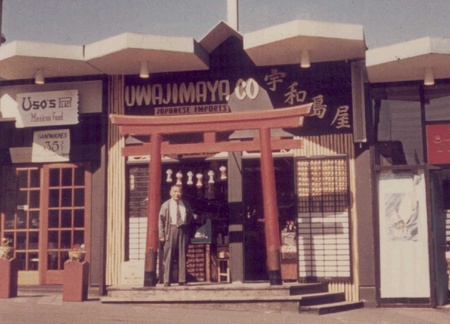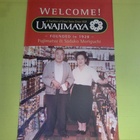In September 1950, five years after the end of the war, the Pacific route connecting Japan and Seattle was reopened, and the following year the San Francisco Peace Treaty (Treaty of Peace with Japan) was signed, and Japan regained its independence. Trade and exchange between the two countries also progressed, and in 1960, spectacular events were held in both Japan and the United States to commemorate the 100th anniversary of the establishment of amity and commerce between the two countries. The Crown Prince of Japan attended the commemorative ceremony in the United States, and also visited Seattle.
Uwajimaya, located on Main Street in Seattle, was frequented by sailors from ships arriving in Seattle from Japan, as well as Japanese women who had married American military men and moved to the United States, who became their customers.
Uwajimaya was bustling with Japanese and Japanese-American customers, but this was the result of the hard work of the Moriguchi family, including Fujimatsu and Sadako.
The eldest son, Kenzo, served in the Army from 1956 to 1958. The second son, Tomio, also served in the National Guard for a time. However, while both went on to study at local universities, they continued to help their parents with the business of the store. In addition to the family, several other employees also began to work at the store.
Sadako cooked lunch for all the employees at the restaurant. Spaghetti was a popular staple. Dinner was prepared by Tomio and her sisters, and families and the employees who were working at the restaurant at the time gathered around the table together. Everyone enjoyed cooked rice with wieners and sausages seasoned with soy sauce and salt. Although it was a busy family-run business, business progressed smoothly.
Enthusiasm for opening a store
However, around this time, the owner, Fujimatsu, began to fall ill. A heavy smoker, he was in his late 50s and had one of his lungs removed due to suspected lung cancer. After that, he seemed in good health, even traveling to Japan, but his health gradually weakened, and he passed away in August 1962. The direct cause of his death seems to have been an operation he had five years earlier.
Fujimatsu was a man of few words, a typical Japanese father, but he was very clear about one thing when he was alive: "We have to open a store at the World Expo."
The Seattle World's Fair was to be held in Seattle for six months starting in April 1962. At the time, the Expo was a special event that attracted a lot of attention, and Fujimatsu saw it as a business opportunity to get involved.
The Seattle World's Fair, with its theme of "Future and Science," was attended by 24 countries and companies, and on a 74-acre site, exhibits and events were held on industry, art, entertainment, and other topics based on predictions of what the 21st century would be like. The Space Needle and monorail, which are now symbols of Seattle, were also scheduled to be built in time for the fair.
The site also included a space for introducing and selling the cultures and products of each country, including a "Japan Pavilion." Fujimatsu had a strong desire to have Uwajimaya open in one of these areas.
Although the space was only about 66 square meters, the store was crowded with many visitors after it was opened. The Japan Pavilion was also popular among the huge success of nearly 10 million people who visited the event over the six months it took place, and Uwajimaya's products also sold well.

My father's vision came true
This was around the time Fujimatsu went under, and the family managed to run the store somehow. Tomio graduated from a local high school and then studied at the University of Washington. He continued to help out at the store during this time, and after graduating in 1961, he got a job at Boeing. It was a relatively flexible job, so he continued to help out when he had time off work. Hisako, the second daughter, also went on to study at the University of Washington, just like her brother. She was still a student at the time of the Expo, but she was the central figure in running the store at the Expo on weekends, during the summer holidays, and after classes.
The upper floors of the building on the main street where Uwajimaya was located were a hotel, but she would go to the venue every day with a man named Fujino who often stayed there. Her friends also helped out. Inside the store, there were Japanese toys, souvenirs, rice crackers and other snacks, and Hisako remembers that they sold "Tomoe Ame" candy. In addition to these, they also sold the usual items such as soft drinks and cigarettes.
"I was running the shop with my female friends and it was a lot of fun," Hisako later said.
Fujimatsu had been thinking of selling various products for this occasion, and at the time, popular items such as rice crackers were lined up here. Among them, an electric rice cooker was particularly novel. At the time, Tomio only helped out at the store as a matter of duty, but looking back on it later, he realized that his father, Fujimatsu, who rarely showed his thoughts publicly, had been thinking about various aspects of business.
"My father had connections with people who ran trade fairs and exhibitions for various products, especially with Japanese people, and I think it was good that these relationships continued," says Tomio.
(Titles omitted)
*Some references from Densho Digital Archives
© 2018 Ryusuke Kawai






